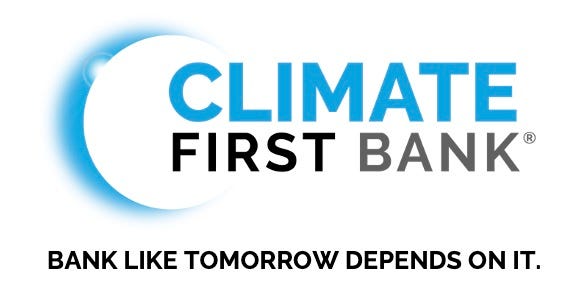Don’t get fooled by greenwashing; vote with your wallet: Ken LaRoe
How to check whether your bank is operating sustainably, or just talking about it.
SPONSORED COMMENTARY
By Ken LaRoe
(Ken LaRoe is founder, chairman, and CEO of Climate First Bank. He is a serial values-based bank entrepreneur and a leader in ethical banking. Ken sold his first bank, Florida Choice Bank in 2006 after growing it to seven locations and over $400 million in assets. In 2009, Ken started First Green Bank, the first bank in the United States with a stated environmental mission. First Green Bank grew to seven locations with over $800 million in assets before its sale in 2018. In 2021, Ken started Climate First Bank, which has a stated vision to meaningfully contribute to the drawdown of atmospheric CO₂.)
ST. PETERSBURG, Fla. (Callaway Climate Insights) — The 27th Conference of the Parties (COP 27) took place last month in Egypt amid record climate challenges in 2022, including flooding, drought, hurricanes, and earthquakes. These disasters continue to keep the climate crisis at the forefront of the media and emphasize the urgency of climate action.
This sentiment was felt throughout the talks and resulted in historic progress on issues, including the creation of a Loss and Damage Fund. After a decade of debate and resistance, the world’s wealthy industrialized nations have finally agreed to provide funding to vulnerable nations hit by disasters which have been intensified by climate change.
In a historic step forward, a resolution passed entrenching the concept of “loss and damage” — the idea that vulnerable nations are entitled to compensation for damages due to climate change related disasters. This historic shift in perspective will hopefully lead to greater progress in ensuring that even the most vulnerable people on this planet receive access to food, water, heat, and shelter as we work to reverse the disastrous effects of climate change.
However, while some issues saw historic progress, others took center stage for different reasons. Greenwashing was a spotlight issue at COP 27, with the UN Expert Group and COP 27 protests calling for change.
UN Report on greenwashing
A report released at COP 27 focused on organizations' net zero commitments. This report not only outlined the rampant greenwashing seen by corporations across the globe but aimed to draw a “red line” around companies’ false environmental commitments. The report lays out a clear list of recommendations that should be followed to ensure that only responsible and credible claims are made.
Fossil-fuel lobbyists
Major fossil fuel organizations using COP 27 as a vehicle for greenwashing were rampant at this year’s summit. According to Corporate Accountability, 636 fossil-fuel lobbyists registered for COP27. By Carbon Brief’s math, if the fossil fuel faction formed a country delegation, it would have made them the second-largest delegation at this year’s talks.
COP27 sponsors
Leading up to COP 27, activists worldwide protested the talks over the issues of greenwashing. Premium sponsorships like that of Coca-Cola, the world’s largest plastic polluter, raised alarm bells. However, the problem was more pronounced than that; according to Corporate Accountability, 18 out of 20 corporate sponsors of the talks directly support or partner with the fossil fuel industry.
Voting with your wallet
The prevalence of greenwashing, as a main topic and controversy of COP 27, is a reminder to stay vigilant of where you shop and spend your money. Banking and financial institutions, for instance, are often thought about as a vehicle for driving climate action.
According to Banktrack.org, since the Paris Climate Agreement in 2015, the world's 60 largest banks have dumped $4.6 trillion into the fossil fuel industry. Thus, although more and more banks message themselves as environmentally friendly and increasingly talk about sustainability, it is essential to check what the bank is doing through its actions. To help understand your bank’s impact, below are a few recommendations on how to tell if your bank is greenwashing:
Find your bank’s sustainability report. Reading your bank’s sustainability report can tell you a lot. Learning about the organization’s products and services can also teach you the strategic importance of sustainability to the organization. Generally speaking, the more sustainability is integrated into the business strategy, the more important sustainability is to the bank.
Check your bank’s partnerships, pledges, and certifications. Often, genuinely committed banks have partnered with credible organizations and signed onto science-based pledges, including Fossil Free Certified, Race to Zero, B Corp, and Partnership for Carbon Accounting Financials (PCAF).
Check your bank’s investment and lending policies. Lending is where most banks make their money. The surest way to learn about your bank’s commitment to sustainability is to investigate its lending policies. Banks genuinely committed to sustainability often limit or do not lend to extractive and environmentally harmful industries.
Advertisement
Climate First Bank: Bank like tomorrow depends on it. . .
. . . Because it truly does. Climate First Bank is America’s only FDIC insured bank focused on environmental sustainability. As a values-based bank offering a complete, full-service portfolio of simple and easy-to-use traditional banking products, we focus on offering products that enable us to use finance as a force for good.
To ensure that we stay true to this philosophy, we have signed on to science-based pledges and partnerships including Fossil Free Certified, the Net-Zero Banking Alliance, Partnership for Carbon Accounting Financials (PCAF), 1% for the Planet, and B Corp. We have also published our first ESG Report and implemented a contra-mission screening list to ensure we are not financing environmentally harmful projects. To learn more, visit our website or call our Florida-based team at 727-335-0500.
Need a last-minute gift? Support our great climate finance journalism by subscribing with our holiday deal. For a limited time, get 15% off any subscription.


